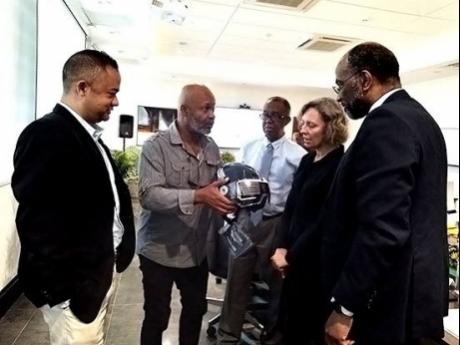60 per cent of bikers not wearing helmets – study
Sixty per cent of motorcycle users have indicated that they do not wear a helmet every time when riding, this despite figures that some 80 per cent of the target group own helmets.
This was revealled in a recent Motorcycle Helmet Study commissioned by the JN Foundation and the National Road Safety Council (NRSA), conducted by Market Research Services Limited.The researchers interviewed 496 people in eight parishes.
The findings of the study support statements made recently by Dr Lucien Jones, chair of the National Road Safety Council, that data have shown that most motorcyclists who died in crashes in Jamaica were not wearing a helmet.
“Our data show that 90 per cent of motorcyclists who died on our roads were not wearing a helmet. The helmet use is not very high [in Jamaica],” he noted during a previous steering committee meeting.
The purpose of the JN Foundation study is to understand knowledge, attitudes, and behaviours related to road usage among motorcyclists, but also among all road–users, including pillion riders, pedestrians, and public and private motor vehicle drivers.
Giving a breakdown of the 60 per cent, Kishka–Kaye Anderson, chief executive officer of Market Research Services Limited, said 21 per cent of motorcyclists interviewed wore a helmet sometimes when they ride; 21 per cent said most times when riding; and eight per cent said rarely wore a helmet when they ride and 10 per cent said, ‘never when I ride’.
“The 10 per cent that said they ‘never wear a helmet when they ride’ is of great concern,” she pointed.
“We pulled out those who said they don’t use a helmet every time they ride, and we wanted to find out why, and they said it depends on how far they are travelling. So, if they are going a short distance, they don’t think it is necessary or important to wear a helmet,” informed Mrs Anderson of Market Research Services Limited.
She said some of the other reasons cited by motorcycle users for not wearing a helmet include: it depends on where they were going (33 per cent); did not own a helmet (20 per cent); rushing and sometimes forgot (16 per cent); don’t like to use helmets (14 per cent); depends on the time of day they are riding (eight per cent); a helmet is uncomfortable (three per cent);helmet caused pain in the neck (two per cent).
The findings of the research also showed that many of the respondents were aware of the importance of having protection certified helmet, with protective padding from impact, face protection and forehead guard.
The study was conducted in eight parishes – Kingston, St. Andrew, St Catherine, St James, Westmoreland, Clarendon, Manchester, and St Elizabeth.
The research was done to support the work of the National Helmet Wearing Coalition, which was established following the signing of an agreement among the JN Foundation, the National Road Safety Council, and the FIA Foundation, to execute the project.
The project has been mandated to advocate for increased helmet wearing among riders and pillions, the use of approved helmets, as well as stimulate the market for helmets.
The survey provides a baseline that will inform the work of the project going forward. A comprehensive stakeholder mapping and engagement exercise is also being undertaken to examine and understand the current situation relating to helmets and helmet wearing in Jamaica.
This will be followed by the development of an action plan highlighting key milestones and policy objectives that will guide the activities of the National Helmet Wearing Coalition during and beyond the timeframe of the project.

